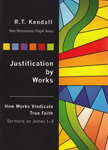When I first envisaged preaching on the Epistle of James in 1980 I panicked at the thought of having to explain James 2:14: “What doth it profit, my brethren, though a man say he hath faith, and have no works? Can faith save him?” I knew the way Evangelical scholars traditionally dealt with it, namely, that justifying faith is always validated by good works; they say that works prove that true faith has set in. That interpretation never satisfied me. Nor did it enter any scholar’s mind (that I know of) that James might be speaking of “him” as someone else but only arguing that the person who claims to have faith must also have works or he could not be saved. It admittedly seems obvious – at first – that the “him” (“Can faith save him?”) of James 2:14 must mean that you needed works to be saved. Roman Catholics therefore never had a problem with this verse. And yet that verse has bedeviled Protestant biblical interpreters for centuries, beginning with Martin Luther who simply dismissed James as “an epistle of straw”. After all, on the surface it would appear that James and Paul could not be in sharper disagreement. Although I admire Luther I refused to believe James was second class. I decided in any case to start preaching on James. I felt a peace that I would know what James 2:14 meant once I had to deal with it months later. I began at James 1:1 and went right through to the end – verse by verse. That was the way I preached.
When I preached on James 2:13 I was no closer to understanding James 2:14. I wondered, “What am I going to do? Simply sweep the dirt under the carpet? Take the traditional view that James is merely stating the true faith also is always accompanied by good works?” After all, I do believe true faith is accompanied by good works; I simply did not believe this is what James was saying in 2:14.
But, lo and behold, as I began preparation on James 2:14 I had a surprising discovery. James is not speaking of the person’s personal salvation at all. He does not say, “Does the man ‘himself ‘ have faith who has no works?” There is no reflexive pronoun. This was important. The big breakthrough was “him” – in the accusative, masculine singular. I saw that James was not talking about the validity of a person’s own salvation. And yet I knew I still had my work cut out for me. In those days I still had Dr. Martyn Lloyd-Jones at my side. I knew he must be convinced if I would get away with a major departure in the history of biblical interpretation.
I came to discover that the key to James 2 is verse 6 – that the Greek word for “poor” (KJV) is ptochon – “poor man”– accusative, masculine singular. When translations say “poor” it sounds plural. “You have despised the poor” sounds like poor people generally. But no. James lifts out an example of a “poor man” – and proceeds with this right through the rest of the chapter. I did not have the English Standard Version in those days which reads, “You have dishonored the poor man”. The NIV strangely translates it merely “poor”.
Most interpreters also assumed that James introduces a new discussion in 2:14. No. The poor man is James’ concern from James 2:6 onwards; indeed, “poor man” is what James is talking about right through the rest of James 2.
The “him” of James 2:14, then, refers to the poor man of James 2:6. It may seem odd to us but not to James himself who wrote it. In other words, it could have read, “Can faith save that poor man?” That poor man out there needs to see our good works if he is going to be persuaded of our faith! Both James 2:6 and James 2:14 are accusative, masculine singular. Read it, beginning with James 2:6. Then keep reading right to the end. I’m really surprised Martin Luther missed this. Had Luther bothered to check James 2:6 carefully and connected it to James 2:14ff, he would never have had a problem with James. James 2:14 to the end, with “poor man” in mind, reads by itself. Although I was convinced I had got it right, you can be sure it was of no small consolation when Dr. Lloyd-Jones looked at me and said, “You have convinced me”. And when my exposition of Hebrews 2:14 came out in the Westminster Record a year or two later, Dr. Michael Eaton wrote and assured me I had indeed got it right – and gave me further grammatical reasons. He later told me this view of James 2:14 revolutionized his ministry in Johannesburg, leading him to open his church to black people.
James 2:14 is therefore not referring to whether we are saved. It refers to whether our testimony will be effective to others, especially to that poor person out there for whom nobody cares.
Get both books for one low price this month only!

